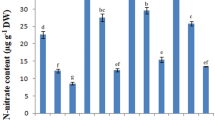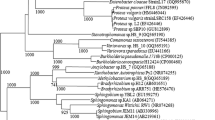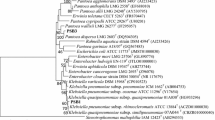Abstract
Salinity is considered one of the main abiotic stresses that severely limit crop growth and productivity. Therefore, it is necessary to develop new ecological technologies that increase crops’ tolerance to salinity. The present work was conducted to investigate the role of four plant growth-promoting rhizobacteria (PGPR) identified as Pantoea agglomerans E1, Streptomyces swartbergensis E5, Pseudomonas zanjanensis LM3, and Streptomyces cahuitamycinicus LL1 in mitigating salinity and improving barley plants (Hordeum vulgare L.) tolerance. Plants were inoculated with different PGPR consortia (C1: E1 + E5, C2: LM3 + LL1, and C3: E1 + E5 + LM3 + LL1) and then subjected to 0 or 120 mM NaCl. Results revealed that salinity negatively affects physiological parameters and activates the production of antioxidant enzymes (superoxide dismutase, catalase, and polyphenol oxidase). However, the application of all bacterial consortia (C1, C2, and C3) at the concentration of 109 UFC/mL attenuated the negative effect of salinity compared to the non-inoculated control. PGPR consortia used show difference in their ability to improve plant parameters, and C3 showed the most apparent effect. This treatment (C3) at the concentration of 109 UFC/mL significantly enhanced shoot dry weight, total chlorophyll, and sugar contents by 89%, 126%, and 55%, respectively. The same treatment increased the superoxide dismutase and catalase activities by 89% and 40%, respectively, under salt conditions. Indeed, C3 was also able to enhance available phosphorus and urease in barley rhizosphere under salt conditions by 179%, 111%, respectively. Overall findings revealed that the PGPR inoculation enhanced the salinity tolerance of barley plants by improving photosynthetic capacity, antioxidant system, soil urease, alkaline phosphatase, invertase, and catalase activities. These PGPR inoculants can be used as an ecological solution method to mitigate salinity.





Similar content being viewed by others
Data availability
The datasets generated during and/or analyzed during the current study are available from the corresponding author on reasonable request.
References
Ait-El-Mokhtar M, Baslam M, Ben-Laouane R, Anli M, Boutasknit A, Mitsui T, Wahbi S, Meddich A (2020) Alleviation of detrimental effects of salt stress on date palm (Phoenix dactylifera L.) by the application of arbuscular mycorrhizal fungi and/or compost. Front Sustain Food Syst 4:131. https://doi.org/10.3389/fsufs.2020.00131
Ali B, Hafeez A, Ahmad S, Javed MA, Sumaira, Afridi MS, Dawoud TM, Almaary KS, Muresan CC, Marc RA, Alkhalifah DHM, Selim S (2022) Bacillus thuringiensis PM25 ameliorates oxidative damage of salinity stress in maize via regulating growth, leaf pigments, antioxidant defense system, and stress responsive gene expression. Front Plant Sci 13:921668. https://doi.org/10.3389/fpls.2022.921668
Arnon DI (1949) Copper enzymes in isolated chloroplasts. Polyphenoloxidase in Beta vulgaris. Plant Physiol 24:1–15. https://doi.org/10.1104/pp.24.1.1
Aubert G (1978) Méthodes D’analyses des Sols. Centre National de documentation Pédagogique, Centre Régional de Documentation Pédagogique, Marseille, France, p 191
Bates LS, Waldren RP, Teare ID (1973) Rapid determination of free proline for water-stress studies. Plant Soil 39:205–207. https://doi.org/10.1007/BF00018060
Bechtaoui N, Raklami A, Tahiri A, Benidire L, El Alaoui A, Meddich A, Gottfert M, Oufdou K (2019) Characterization of plant growth promoting rhizobacteria and their benefits on growth and phosphate nutrition of faba bean and wheat. Biol Open 8:bio043968. https://doi.org/10.1242/bio.043968
Ben-Laouane R, Baslam M, Ait-El-Mokhtar M, Anli M, Boutasknit A, Ait-Rahou Y, Toubali S, Mitsui T, Oufdou K, Wahbi S, Meddich A (2020) Potential of native arbuscular mycorrhizal fungi, rhizobia, and/or green compost as alfalfa (Medicago sativa) enhancers under salinity. Microorganisms 8:1695. https://doi.org/10.3390/microorganisms8111695
Boyrahmadi M, Raiesi F (2018) Plant roots and species moderate the salinity effect on microbial respiration, biomass, and enzyme activities in a sandy clay soil. Biol Fertil Soils 54:509–521. https://doi.org/10.1007/s00374-018-1277-6
Bradford MM (1976) A rapid and sensitive method for the quantitation of microgram quantities of protein utilizing the principle of protein-dye binding. Anal Biochem 72:248–254. https://doi.org/10.1016/0003-2697(76)90527-3
Dell’Aversana E, Hessini K, Ferchichi S, Fusco GM, Woodrow P, Ciarmiello LF, Abdelly C, Carillo P (2021) Salinity duration differently modulates physiological parameters and metabolites profile in roots of two contrasting barley genotypes. Plants 10:307. https://doi.org/10.3390/plants10020307
Desoky ESM, El-maghraby LM, Awad AE, Abdo AI, Rady MM, Semida WM (2020) Fennel and ammi seed extracts modulate antioxidant defence system and alleviate salinity stress in cowpea (Vigna unguiculata). Sci Hortic 272:109576. https://doi.org/10.1016/j.scienta.2020.109576
Duarte B, Goessling JW, Marques JC, Caçador I (2015) Ecophysiological constraints of Aster tripolium under extreme thermal events impacts: merging biophysical, biochemical and genetic insights. Plant Physiol Biochem 97:217–228. https://doi.org/10.1016/j.plaphy.2015.10.015
Dubois M, Gilles KA, Hamilton JK, Rebers PT, Smith F (1956) Colorimetric method for determination of sugars and related substances. Anal Chem 28:350–356. https://doi.org/10.1021/ac60111a017
El-Esawi MA, Al-Ghamdi AA, Ali HM, Alayafi AA (2019) Azospirillum lipoferum FK1 confers improved salt tolerance in chickpea (Cicer arietinum L.) by modulating osmolytes, antioxidant machinery and stress-related genes expression. Environ Exp Bot 159:55–65. https://doi.org/10.1016/j.envexpbot.2018.12.001
Evelin H, Devi TS, Gupta S, Kapoor R (2019) Mitigation of salinity stress in plants by arbuscular mycorrhizal symbiosis: current understanding and new challenges. Front Plant Sci 10:470. https://doi.org/10.3389/fpls.2019.00470
FAOSTAT (2022) United Nations Food and Agricultural Organization [WWW Document]. http://www.fao.org/faostat/en/#data. Accessed 29.09.22
Guan SY (1986) Soil enzyme and its research methods. Agricultural, Beijing
Gupta S, Pandey S (2019) ACC deaminase producing bacteria with multifarious plant growth promoting traits alleviates salinity stress in french bean (Phaseolus vulgaris) plants. Front Microbiol 10:1506. https://doi.org/10.3389/fmicb.2019.01506
Hassan A, Amjad SF, Saleem MH, Yasmin H, Imran M, Riaz M, Ali Q, Joyia FA, Ahmed S, Ali S, Alyemeni MN (2021) Foliar application of ascorbic acid enhances salinity stress tolerance in barley (Hordeum vulgare L.) through modulation of morpho-physio-biochemical attributes, ions uptake, osmo-protectants and stress response genes expression. Saudi J Biol Sci 28:4276–4290. https://doi.org/10.1016/j.sjbs.2021.03.045
HoRI K, Wada A, Shibuta T (1997) Changes in phenoloxidase activities of the galls on leaves of Ulmus davidana formed by Tetraneura fuslformis (Homoptera: Eriosomatidae). Appl Entomol Zool 32:365–371. https://doi.org/10.1303/aez.32.365
Hussain S, Shaukat M, Ashraf M, Zhu C, Jin Q, Zhang J (2019) Salinity stress in arid and semi-arid climates: effects and management in field crops. Climate Change and Agriculture. IntechOpen, London
Ilyas N, Mazhar R, Yasmin H, Khan W, Iqbal S, Enshasy HE, Dailin DJ (2020) Rhizobacteria isolated from saline soil induce systemic tolerance in wheat (Triticum aestivum L.) against salinity stress. Agronomy 10:989. https://doi.org/10.3390/agronomy10070989
Kerbab S, Silini A, Chenari Bouket A, Cherif-Silini H, Eshelli M, El Houda Rabhi N, Belbahri L (2021) Mitigation of NaCl stress in wheat by rhizosphere engineering using salt habitat adapted PGPR halotolerant bacteria. Appl Sci 11:1034. https://doi.org/10.3390/app11031034
Khare E, Mishra J, Arora NK (2018) Multifaceted interactions between endophytes and plant: developments and prospects. Front Microbiol 9:2732. https://doi.org/10.3389/fmicb.2018.02732
Kumar A, Singh S, Mukherjee A, Rastogi RP, Verma JP (2021) Salt-tolerant plant growth-promoting Bacillus pumilus strain JPVS11 to enhance plant growth attributes of rice and improve soil health under salinity stress. Microbiol Res 242:126616. https://doi.org/10.1016/j.micres.2020.126616
Li X, Sun P, Zhang Y, Jin C, Guan C (2020) A novel PGPR strain Kocuria rhizophila Y1 enhances salt stress tolerance in maize by regulating phytohormone levels, nutrient acquisition, redox potential, ion homeostasis, photosynthetic capacity, and stress-responsive genes expression. Environ Exp Bot 174:104023. https://doi.org/10.1016/j.envexpbot.2020.104023
Liu J, Xie J, Chu Y, Sun C, Chen C, Wang Q (2008) Combined effect of cypermethrin and copper on catalase activity in soil. J Soils Sediments 8:327–332. https://doi.org/10.1007/s11368-008-0029-x
Madhava Rao KV, Sresty TVS (2000) Antioxidative parameters in the seedlings of pigeonpea (Cajanus cajan (L.) Millspaugh) in response to Zn and Ni stresses. Plant Sci 157:113–128. https://doi.org/10.1016/S01689452(00)00273-9
Mahmoud OMB, Hidri R, Talbi-Zribi O, Taamalli W, Abdelly C, Djébali N (2020) Auxin and proline producing rhizobacteria mitigate salt-induced growth inhibition of barley plants by enhancing water and nutrient status. S Afr J Bot 128:209–217. https://doi.org/10.1016/j.sajb.2019.10.023
Mansouri FE, Lovillo MP, El Farissi H, Oufdou H, Brigui J (2021) Extraction, analysis of polyphenols and antioxidant properties of moroccan barley seed extracts (Hordeum vulgare L). Mater Today: Proc 43:1896–1902. https://doi.org/10.1016/j.matpr.2020.10.922
Masmoudi F, Tounsi S, Dunlap CA, Trigui M (2021) Halotolerant Bacillus spizizenii FMH45 promoting growth, physiological, and antioxidant parameters of tomato plants exposed to salt stress. Plant Cell Rep 40:1199–1213. https://doi.org/10.1007/s00299-021-02702-8
Mukhopadhyay R, Sarkar B, Jat HS, Sharma PC, Bolan NS (2021) Soil salinity under climate change: challenges for sustainable agriculture and food security. J Environ Manage 280:111736. https://doi.org/10.1016/j.jenvman.2020.111736
Nawaz A, Shahbaz M, Imran A, Marghoob MU, Imtiaz M, Mubeen F, Nawaz A, Shahbaz M (2020) Potential of salt tolerant PGPR in growth and yield augmentation of wheat (Triticum aestivum L.) under saline conditions. Front Microbiol 11:2019. https://doi.org/10.3389/fmicb.2020.02019
Ohshima T, Tamura T, Sato M (2007) Influence of pulsed electric field on various enzyme activities. J Electrostat 65:156–161. https://doi.org/10.1016/j.elstat.2006.07.005
Olsen SR, Sommers LE (1982) Phosphorus. In: Page AL, Miller RH, Keeney DR (eds) Methods of soil analysis-part 2. Chemical and Microbiological Properties. Agron Monograph, vol 9, 2nd edn. ASA and SSSA, Madison, pp 403–430
Pan J, Peng F, Xue X, You Q, Zhang W, Wang T, Huang C (2019) The growth promotion of two salt-tolerant plant groups with PGPR inoculation: a meta-analysis. Sustainability 11:378. https://doi.org/10.3390/su11020378
Raklami A, Bechtaoui N, Tahiri A, Slimani A, Bargaz A, Meddich A, Oufdou K (2021) Co-inoculation with rhizobacteria and mycorrhizae can improve wheat/faba bean intercrop performance under field conditions. Front Agron 3:734923. https://doi.org/10.3389/fagro.2021.734923
Rekik I, Chaabane Z, Missaoui A, Chenari Bouket A, Luptakova L, Elleuch A, Belbahri L (2017) Effects of untreated and treated wastewater at the morphological, physiological and biochemical levels on seed germination and development of sorghum (Sorghum bicolor (L.) Moench), alfalfa (Medicago sativa L.) and fescue (Festuca arundinacea Schreb). J Hazard Mater 326:165–176. https://doi.org/10.1016/j.jhazmat.2016.12.033
Saeid A, Prochownik E, Dobrowolska-Iwanek J (2018) Phosphorus solubilization by Bacillus species. Molecules 23:2897. https://doi.org/10.3390/molecules23112897
Sayahi N, Djemal R, Ben Merdes K, Saidi NM, Yengui M, Gdoura R, Ebel C, Aydi S, Mechichi T, Hanin M (2022) Characterization of Siccibacter sp. Strain C2 a novel rhizobacterium that enhances tolerance of barley to salt stress. Curr Microbiol 79:1–13. https://doi.org/10.1007/s00284-022-02930-5
Shabaan M, Asghar HN, Zahir ZA, Zhang X, Sardar MF, Li H (2022) Salt-tolerant PGPR confer salt tolerance to maize through enhanced soil biological health, enzymatic activities, nutrient uptake and antioxidant defense. Front Microbiol 13:901865. https://doi.org/10.3389/fmicb.2022.901865
Shameer S, Prasad V (2018) Plant growth promoting rhizobacteria for sustainable agricultural practices with special reference to biotic and abiotic stresses. Plant Growth Regul 84:603–615. https://doi.org/10.1007/S10725-017-0365-1
Slimani A, Raklami A, Oufdou k, Meddich A (2022) Isolation and characterization of PGPR and their potential for drought alleviation in barley plants. Gesunde Pflanz. https://doi.org/10.1007/s10343-022-00709-z
Tabatabai MA (1994) Soil enzymes. In: WA Dick (ed) Methods of soil analysis, 2. Microbiological and biochemical properties. Soil Science Society of America, Madison, pp 775–833
Tirry N, Kouchou A, Laghmari G, Lemjereb M, Hnadi H, Amrani K, Bahafid W, el Ghachtouli N (2021) Improved salinity tolerance of Medicago sativa and soil enzyme activities by PGPR. Biocatal Agric Biotechnol 31:101914. https://doi.org/10.1016/j.bcab.2021.101914
Toubali S, Tahiri AI, Anli M, Symanczik S, Boutasknit A, Ait-El-mokhtar M, Ben-Laouane R, Oufdou K, Ait-Rahou Y, Ben-Ahmed H, Jemo M, Hafidi M, Meddich A (2020) Physiological and biochemical behaviors of date palm vitroplants treated with microbial consortia and compost in response to salt stress. Appl Sci 10:1–25. https://doi.org/10.3390/app10238665
Velikova V, Yordanov I, Edreva A (2000) Oxidative stress and some antioxidant systems in acid rain-treated bean plants: protective role of exogenous polyamines. Plant Sci 151:59–66. https://doi.org/10.1016/S0168-9452(99)00197-1
Wang G, Li B, Peng D, Zhao H, Lu M, Zhang L, Li J, Zhang S, Guan C, Ji J (2022) Combined application of H2S and a plant growth promoting strain JIL321 regulates photosynthetic efficacy, soil enzyme activity and growth-promotion in rice salt stress. Microbiol Res 256:126943. https://doi.org/10.1016/j.micres.2021.126943
Yang A, Akhtar SS, Fu Q, Naveed M, Iqbal S, Roitsch T, Jacobsen SE (2020) Burkholderia Phytofirmans PsJN stimulate growth and yield of quinoa under salinity stress. Plants 9:672. https://doi.org/10.3390/plants9060672
Funding
The present work was partially supported by FOSC project (Sus-Agri-CC) from the European Union’s Horizon 2020 research and innovation program under grant agreement N°862555.
Author information
Authors and Affiliations
Contributions
Conceptualization: S.A., R.A, M.A, and O.K.; Methodology: S.A., M.A., and O.K.; Data curation & Formal analysis: S.A., B.B; Investigation: S.A., R.A; Writing-original draft: S.A.; Writing-review & editing: M.A., O.K., and R.A.; Funding acquisition: M.A. and O.K; Resources: M.A. and O.K.; Supervision: M.A. and O.K.
Corresponding author
Ethics declarations
Competing interests
Authors are required to disclose financial or non-financial interests that are directly or indirectly related to the work submitted for publication.
Additional information
Publisher’s Note
Springer Nature remains neutral with regard to jurisdictional claims in published maps and institutional affiliations.
Rights and permissions
Springer Nature or its licensor (e.g. a society or other partner) holds exclusive rights to this article under a publishing agreement with the author(s) or other rightsholder(s); author self-archiving of the accepted manuscript version of this article is solely governed by the terms of such publishing agreement and applicable law.
About this article
Cite this article
Slimani, A., Raklami, A., Benmrid, B. et al. Salt-tolerant plant growth-promoting rhizobacteria mitigate salinity in barley by improving photosynthetic capacity, antioxidant activity, and soil fertility. Biologia 78, 3367–3379 (2023). https://doi.org/10.1007/s11756-023-01541-0
Received:
Accepted:
Published:
Issue Date:
DOI: https://doi.org/10.1007/s11756-023-01541-0




